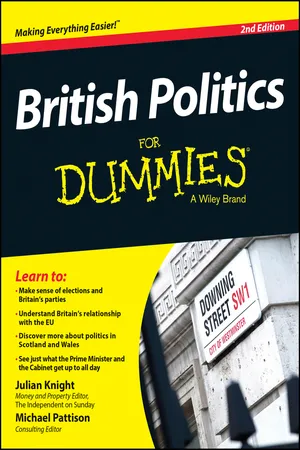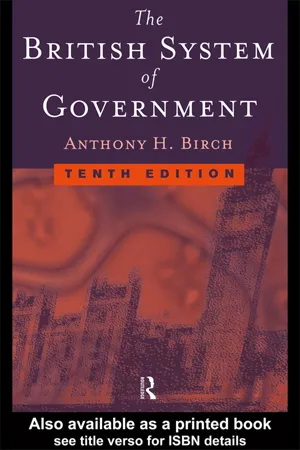Politics & International Relations
General Elections UK
General Elections in the UK are national elections held to elect Members of Parliament (MPs) to the House of Commons. They typically occur every five years, but can be called earlier under certain circumstances. The party that wins the majority of seats in the House of Commons forms the government, and the leader of that party becomes the Prime Minister.
Written by Perlego with AI-assistance
Related key terms
2 Key excerpts on "General Elections UK"
- eBook - ePub
- Julian Knight, Michael Pattison(Authors)
- 2015(Publication Date)
- For Dummies(Publisher)
When you think about British elections your mind probably turns to a general election, with the high-profile national politicians going head to head and the airwaves crackling with all things political. However, the UK has lots of different elections in which you have a right to vote. Here’s a quick guide to the UK’s election scene:- General elections: These elections are considered the biggies, with seats up for grabs in the UK parliament. Traditionally, these elections have the biggest turnouts and receive the most media coverage. Prime ministers (PMs) used to be able to call elections whenever they wanted, but under a new law introduced in 2010 general elections now occur once every five years, setting in stone five-year fixed-term parliaments.
- Devolved elections: The Scottish parliament and the Welsh and Northern Irish assemblies are big deals to the millions of people living in these parts of the UK. These bodies have lots of powers and in some ways are more important to people living within their compass than the UK parliament. Elections to these bodies take place once every four years and the system used is partly first past the post and partly proportional representation (check out the later sections ‘Coming Up On the Rails: The First-Past-the-Post System ’ and ‘Examining Proportional Representation’, respectively).
- Local government elections: From county, parish and community councils to mayors, across the UK almost every year a new set of elections is held. These elections may not have the glamour of a general or devolved election but they’re important, because local government is responsible for many of the nation’s public services, as well as raising council taxes and business rates and approving or turning down planning applications. Chapter 17 has more on the inner workings of local government.
- European parliamentary elections: In some ways European elections shouldn’t be last in this list of elections, because many of the laws governing the life of Britons come from the European Union (EU). Turnout tends to be low – usually only between 30 and 40 per cent of people registered to vote bother to do so – and they take place once every five years, under a complex system called the D’Hondt method (see ‘Dividing in the D’Hondt method ’, later in this chapter). The last European election was in 2014, and so the next is scheduled for 2019.
- eBook - ePub
- Anthony H Birch(Author)
- 2013(Publication Date)
- Routledge(Publisher)
The overall result was a record-breaking victory for Labour, better described as a tidal wave then a landslide as it swept across the whole of Britain. The Conservative share of the vote, 31.4 per cent, was the lowest since 1832, and the number of their candidates to be elected was the lowest since 1906. The swing from Conservative to Labour, 10 per cent, was the largest since 1945, and the number of Labour MPs elected, 418, was the largest ever. Other features of the result were that the Liberal Democrats doubled their parliamentary representation, which rose from 20 in 1992 to 46 in 1997, their best result since 1929, and that the number of women elected rose from 59 to 120, of whom 101 were Labour MPs. It was altogether a sensational election, which may usher in a new era in British history.Further reading
The best account of electoral procedures is that in Leonard (1996) Elections in Britain Today; for discussions of the case for electoral reform see Jowell and Oliver (1989) The Changing Constitution, chs. 4 and 13; for analyses of voting behaviour see Sarlvic and Crewe (1983) Decade of Dealignment and Himmelweit et al. (1981) How Voters Decide; after each general election David Butler and a colleague publish a valuable analysis of the issues, campaign and results, of which the most recent is Butler and Kavanagh (1992) The British General Election of 1992; for an overview and analysis of changes since 1945 see Butler (1989) British General Elections since 1945.Passage contains an image
7: PRESSURE GROUPS
Seen in the light of democratic theory, the citizen is first and foremost an elector, having general views about government and expressing preferences between one political party and another. Seen in another light, the citizen is not so much a whole political individual as a bundle of specific interests and values, having definite views about particular issues of policy. A citizen with children will be concerned about education and the maintenance of child allowances; one with a widowed mother will be worried about the level of widows’ pensions; sports enthusiasts will want more playing fields; trade unionists will have views about the law relating to trade unions; animal lovers will be concerned about animal welfare. The list could be extended almost indefinitely.
Learn about this page
Index pages curate the most relevant extracts from our library of academic textbooks. They’ve been created using an in-house natural language model (NLM), each adding context and meaning to key research topics.

